#invasion of iraq
Text
I’m just gonna say it, while Russia’s invasion of Ukraine rightfully being condemned, is barbaric & beyond stupid, and left them with heavy sanctions- The US deserves that exact same treatment and should have been the most sanctioned country in the world after they invaded Iraq 20 years ago
1 million Iraqis dead- family, friends, children, and community gone, a whole region of the world destabilized, infrastructure destroyed, abuse of women and children, and extensive torture & torture networks and black sites that defy humanity. All from an *illegal* war, and it’s even worse when you look at all the other places we invaded- and the US received *zero* consequences for what it’s done.
It’s only fair, right?
#anti-imperialism#iraq#george bush#joe biden#iraq war#invasion of iraq#imperialism#russia#George W. Bush#socialism#democratic socialism#communism#marxism#maoism#war in iraq#marxism-leninism
2K notes
·
View notes
Text

🇮🇶⚔️ 🇺🇲 🚨
GOVERNMENT OF IRAQ MOVES TO END U.S. OCCUPATION PRESENCE
The Iraqi government will move to end the presence of the U.S.-led coalition occupation in Iraq, according to the Iraqi Prime Minister, Mohammed Shia' al-Sudani.
Al-Sudani made the comments at a joint press conference with the visiting Spanish Prime Minister, Pedro Sanchez on Thursday, Dec. 28th.
Al-Sudani said the topic was broached during his meeting with Sanchez, during which they discussed the details of the presence of the international coalition in Iraq.
"We appreciate the role of the coalition in supporting Iraq's efforts to confront the Islamic State militants," Al-Sudani said.
"The Iraqi government is in the process of rearranging the relationship with the international coalition in light of the presence of capable Iraqi forces," said the Iraqi prime minister, stressing that "the Iraqi government is moving toward ending the presence of the international coalition forces, which include security advisers who support the security forces in the areas of training, advice, and intelligence cooperation."
The two leaders discussed in depth the difficult situation in the Middle East, including the ongoing Israeli genocide of Palestinians in Gaza. Al-Sudani said he appreciated Spain's role and its "courageous stance in condemning these attacks."
Sanchez, for his own part, expressed his country's desire to develop relations with Iraq, in particular the fields of transportation, education, climate change, and defense.
The Spanish Prime Minister also met with the Iraqi President, Abdul Latif Rashid, to discuss ways to enhance bilateral cooperation, and the need to end the genocide in Gaza.
Spain is part of the U.S.-led international coalition tasked with training and advising Iraq's Security Forces in its fight against the radical islamic group, ISIS.
#source
@WorkerSolidarityNews
#iraq#iraq news#iraqi news#iraqi politics#iraq politics#middle east news#middle east#us occupation#occupation of iraq#us military#invasion of iraq#war#wars#war news#politics#news#geopolitics#world news#global news#international news#breaking news#current events#conflict#international coalition in iraq#invasion#occupation#us politics#us wars#us foreign policy#us news
153 notes
·
View notes
Text
We’re just now commemorating the 20th anniversary of the US invasion of Iraq … worst crime of the century, it’s being commemorated here. The US Navy just commissioned its most recent assault vessel and named it the USS Fallujah in memory of one of the worst atrocities of the US attack.
Fallujah had been … a beautiful city. Marines invaded, destroyed it, killed thousands of people … People are still dying from the weapons that were used with phosphorus, depleted uranium.
It’s more than atrocious, it’s symbolic.
Look over the past 20 years, see if you can find one sentence anywhere near the mainstream that says that the invasion of Iraq was a crime – it was the worst crime of the 20th century. The worst criticism you can make is it was a ‘mistake’. It’s been reconfigured, reshaped to be presented – even by liberal commentators – as a failed effort to save the Iraqi people from an evil dictator, which has absolutely nothing to do with why the war began.
Q&A: Noam Chomsky on Palestine, Israel and the state of the world
#palestine#israel#invasion of iraq#noam chomsky#war crimes#propaganda#atypicalreads#free palestine#Fallujah#US Navy#us attack#liberal#progressive
33 notes
·
View notes
Link
When President George W. Bush invaded Iraq 20 years ago this week, I was in the middle of the smoke and chaos of that cataclysmic war that became his best-known legacy. I wrote countless columns opposing an invasion, then I was scathing as I covered the war, and I still see it as a practical and moral catastrophe.
But wait -- what if there’s something Bush did that was even more consequential than the invasion of Iraq? And what if it was something astonishingly good?
This is awkward, but I have to acknowledge that Bush deserves credit for the single best policy of any President in my lifetime. It’s called PEPFAR and if you haven’t heard of it, that’s part of the problem.
So my colleagues and I in New York Times Opinion made this video essay about an initiative that Bush created 20 years ago that saved 25 million lives. With the anniversary of the Iraq invasion, there’s lots of commentary about his miscalculations and failures, and there should be. But we liberals also have to acknowledge that the most important humanitarian program of modern times wasn’t started by a progressive we admire but by a conservative evangelical whose policies we deplored.
-- Nicholas Kristof, New York Times
#PEPFAR#Humanitarian Aid#History#Politics#Africa#AIDS#George W. Bush#President Bush#Bush 43#Bush Administration#Iraq War#Invasion of Iraq#New York Times#HIV/AIDS#President's Emergency Plan for AIDS Relief#AIDS in Africa#HIV/AIDS Epidemic#History is complicated
18 notes
·
View notes
Text
Was there any real attempt to prosecute George Bush and Tony Blair for the invasion of Iraq and the war crimes they committed?
14 notes
·
View notes
Text
"Oh no the poor american war veteran has trauma from serving in iraq :(("
What were you doing in iraq? Oceans away from your home? Why were you on a land that's nowhere near yours, that's continents away? What were you doing there?
And why do these conversations never center iraqi trauma? What about the trauma of the iraqi soldier? Of the iraqi citizen? Why is it only the american soldier's mental health that matters?
What of the iraqi soldier forced away to bleed for a home he does not know if he can save? What of the citizens who's houses were bombed? What of the families that waited anxiously to hear from their loved ones on war front, who could not reach because communication lines were targeted? What of the soldier serving on the other side of this equation, bleeding out to save his family, only to receive news weeks later — delayed — that they are all dead, that his home may no longer exist?
What of the bloodlines completely wiped? What of the intergenerational trauma? What of the generation who grew up knowing nothing but war?
What about iraqi trauma? Iraqi pain.
Your american soldier fought knowing full well that his family is safe. That he would not come back to a city, a village, a home, that no longer exists. The iraqi soldier had no such luxuries.
Your american soldier did not fight to protect his home, or family, he fought as tool in furthering american imperialism. His country was not ravished by the war they waged, and he fought knowing they were safe. This was not a war on two fronts.
So, again, what about iraqi trauma?
56 notes
·
View notes
Text
Coming home late in the evening as a young girl in the southern Iraqi city of Basra, Zainab, then 15, feared each day could be the last time she could go to school. Living in a conservative district in Basra province, where females out alone in the evening are frowned upon, Zainab’s family were not happy about it. They were also concerned about her safety.
Her school, like many in Iraq, had been forced to divide and rotate pupils into morning, afternoon and evening shifts as there were not enough buildings available to accommodate all the students at once.
The late evenings led to arguments with her family, but her parents’ faith in education, despite their illiteracy, meant Zainab was able to complete her education – though not in Iraq, as her family later left for Jordan, escaping conflict and instability.
“I was a smart and hard-working student. But in both Iraq and Jordan, I was always fearful I would have to drop out,” says Zainab.
Other girls have not been so fortunate. Unicef estimates that about 3.2 million school-age Iraqi children are out of school.
It’s a far cry from the vision outlined by President George W Bush in March 2004, a year after the US-led invasion of Iraq. At the time, a new future of liberation and education for women and girls had been part of the moral justification for the invasion.
“For women and girls, liberation has a special significance. Some of these girls are attending school for the first time. It’s hard for people in America to imagine. A lot of young girls now get to go to school,” Bush had said in 2004, with reference to Afghanistan and Iraq.
The education system had already been affected by a decade of sanctions and the three wars waged during the Ba’athist era. In 2004, a study published by the Iraqi education ministry and Unicef found the education system lacked the basics necessary to provide children with adequate education, especially girls, whose enrolment was lower than boys across all grades.
It has not improved over the past two decades. Only 6% of the state budget has been allocated to education despite its importance for economic growth. For girls, education opens up new possibilities through career development or entrepreneurship, as well as the potential for them to create more economic opportunities for others.
Girls are also at an increased risk of dropping out as they progress through education, with one in 14 girls in Iraq aged between 15 and 19 giving birth, according to estimates by the charity Save the Children.
As of 2017, Iraq had the lowest female literacy rate (79.9%) in the region, below the global average of 83.3%. This is despite article 34 of the Iraqi constitution, which stipulates that primary education should be free and obligatory for all children.
8 notes
·
View notes
Photo

They say we're lucky as we have freedom of thought and no censorship. This old gruesome post wasn't even in the flagged posts box.
#Iraq War#invasion of Iraq#middle east#War on terror#oil#George W Bush administration#US imperialism#War in Iraq#Obama administration#war on terrorism#Baghdad#civilians#military–industrial complex#US army#children#XXI century#US military interventions#torture#genocide#war crimes#crimes against humanity#manslaughter#murders#kidnapping#human rights violation#Abu Ghraib#shock and awe#Joe Biden#Guantanamo Bay prison#Tony Blair
23 notes
·
View notes
Text
If you supported the invasion of Irak in 2003, the very least you can do is admit you were a gullible idiot instead of lying about how very complex and very noooanced it was and can anyone ever know what is righ and what is wrong, really.
5 notes
·
View notes
Text
Breakfast of Champions
Breakfast of Champions - Always as a young kid, I think that I was always very precocious, but not overly analytical. Like much of my generation I grew up in the suburbs of a fairly middle-class existence, with a fairly middle-class youth. This was not
A Menagerie of People whom were in my graduating class my senior year of high school. Most I rarely saw outside of high school, and whom I began to derisively refer to as “The Reich”, for their expertise at skullduggery, and other exclusionary practices. There’s were truly games without frontiers.Carrie Murphy (Bottom), My ideal girl next door, whom at the time of the events of 9/11 found comfort…
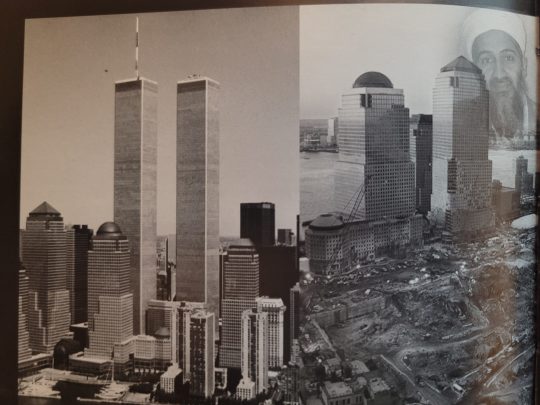
View On WordPress
#9/11#Attack on the Homeland#Diplomacy#internal security#Invasion of Afghanistan#Invasion of Iraq#Iraq War#Iraq War Anniversary#middle-east#Osama Bin Laden#politics#Saddam Hussein#United States
1 note
·
View note
Text
I’m going to keep posting scenarios I come up with using this website and no one is going to stop me
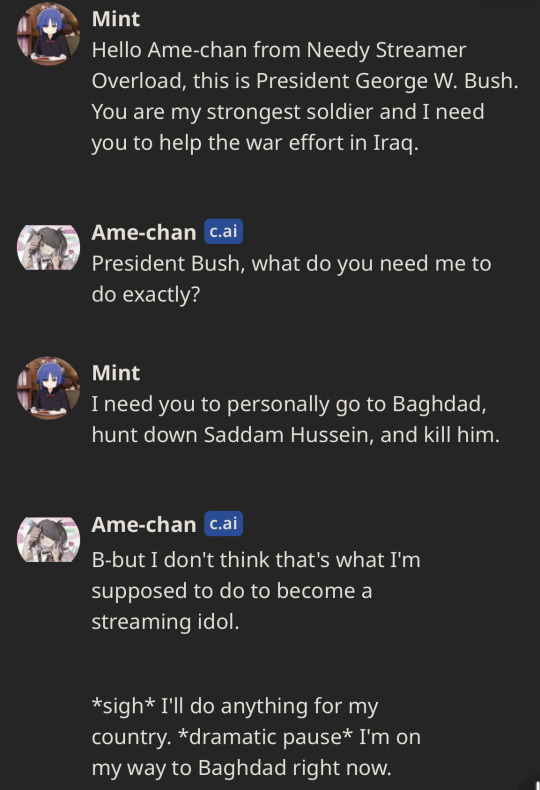
#character.ai#needy streamer overload#needy streamer overdose#ame chan#invasion of iraq#operation iraqi freedom#george w bush#saddam hussein
1 note
·
View note
Text
Foreign Affairs: Gideon Rose: 'Iraq in Retrospect'
SourceForeign Affairs– welcome to Iraq, also known as Hell on Earth.
Source:FRS FreeState
“Ten years ago this week, the United States and a few of its allies invaded Iraq, writing the final chapter in Washington’s checkered decades-long relationship with Saddam Hussein. Thanks to problems of both conception and execution, the Iraq war ended up becoming the most egregious failure in half a century…
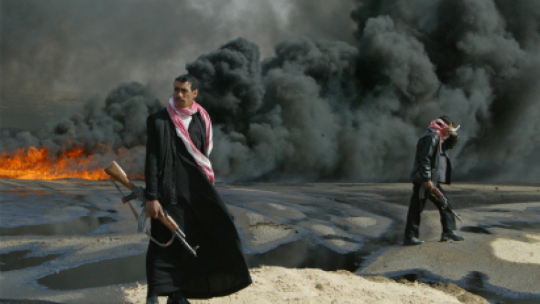
View On WordPress
#2003#2003 War in Iraq#America#Arabia#Carnegie Council#Center Right#George W. Bush#George W. Bush Administration#George W. Bush Presidency#Gideon Rose#Invasion of Iraq#Iraq#Iraq War#Neoconservatism#Neoconservatives#Preemptive War#Republican Party#The 2000s#The White House#United States#Washington#Washington DC
0 notes
Photo
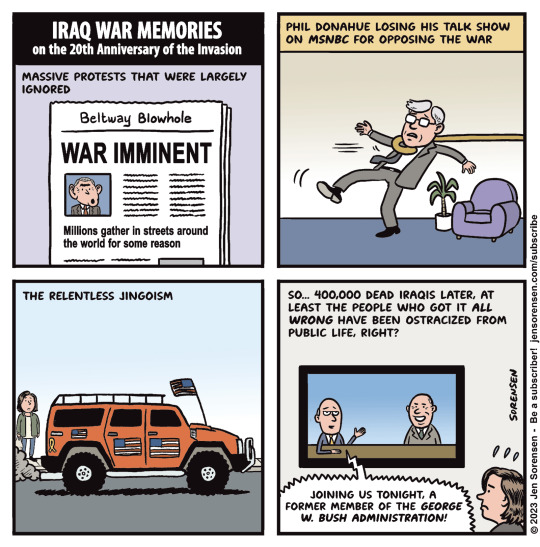
Jen Sorensen.
3K notes
·
View notes
Text
"The result is an absence of checks and balances in Russia, and the decision of one man to launch a wholly unjustified and brutal invasion of Iraq — I mean of Ukraine," Bush said.”
"Iraq… anyway," he said with a shake of his head, as members of the audience chuckled. He then cited his age, 75, before returning to his speech.”
Nah, that wasn’t your age. That was all the blood in your hands speaking for itself.
#george bush#bush#george w bush#iraq#iraq war#ukraine#ukraine war#invasion of iraq#american imperialism#war criminal
0 notes
Text
The reasons Mr. Hussein failed to clarify that he had no weapons of mass destruction in the run-up to 2003 are embedded in his tragic, decades-long conflict with Washington: his furtive, mistrustful collaboration with the C.I.A. during the 1980s; the Gulf War of 1990 and 1991; the U.N.-backed struggle over Iraqi disarmament that followed; and the climactic confrontation after Sept. 11.
Shortly after the Gulf War, he secretly ordered the destruction of his chemical and biological arms, as Washington and the United Nations had demanded. He hoped this action would allow Iraq to pass disarmament inspections, but he covered up what he had done and lied repeatedly to inspectors. He did not tell the truth to his own generals, fearing that he might invite internal or external attacks. His decision to comply with international demands but to lie about it to U.N. inspectors defied Western logic. But Mr. Hussein would not submit to public humiliation, not least because he thought it wouldn’t work. “One of the mistakes some people make is that when the enemy has decided to hurt you, you believe there is a chance to decrease the harm by acting in a certain way,” he told a colleague. In fact, he said, “The harm won’t be less.”
Mr. Hussein believed the C.I.A. was all but omniscient, and so, particularly after Sept. 11, when Mr. Bush accused him of hiding weapons of mass destruction, he assumed that the agency already knew that he had no dangerous weapons and that the accusations were just a pretense to invade.
A C.I.A. capable of making an analytical mistake on the scale of its miss about Iraq’s weapons of mass destruction was not part of his worldview.
--Steve Coll, "Why Authoritarians Like Saddam Hussein Confound U.S. Presidents," New York Times, Feb. 28, 2024.
444 notes
·
View notes
Text
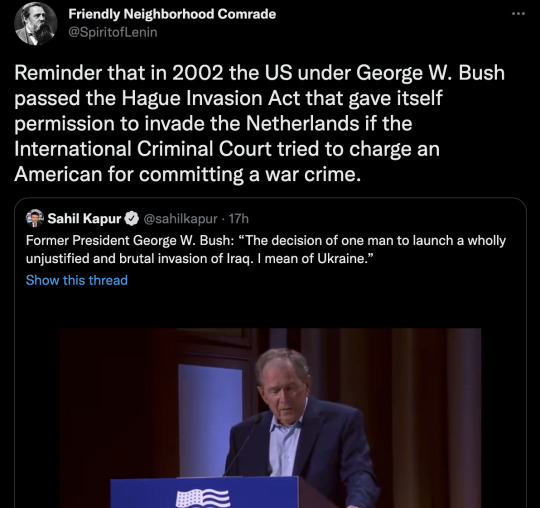


HRW: U.S.: 'Hague Invasion Act' Becomes Law
Excerpt:
U.S. President George Bush today signed into law the American Servicemembers Protection Act of 2002, which is intended to intimidate countries that ratify the treaty for the International Criminal Court (ICC). The new law authorizes the use of military force to liberate any American or citizen of a U.S.-allied country being held by the court, which is located in The Hague. This provision, dubbed the "Hague invasion clause," has caused a strong reaction from U.S. allies around the world, particularly in the Netherlands.
In addition, the law provides for the withdrawal of U.S. military assistance from countries ratifying the ICC treaty, and restricts U.S. participation in United Nations peacekeeping unless the United States obtains immunity from prosecution. At the same time, these provisions can be waived by the president on "national interest" grounds.
0 notes